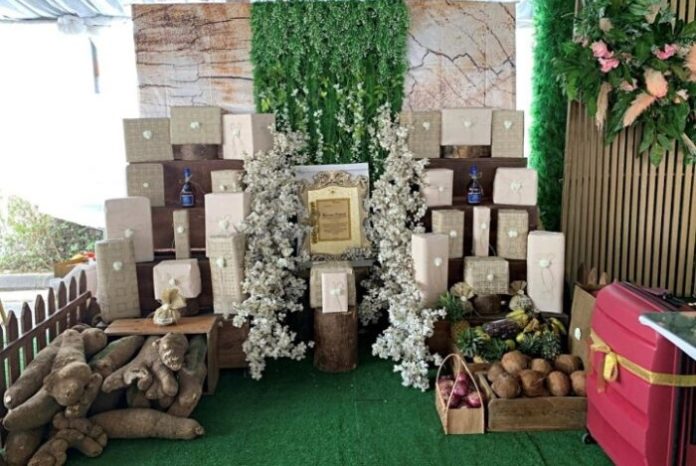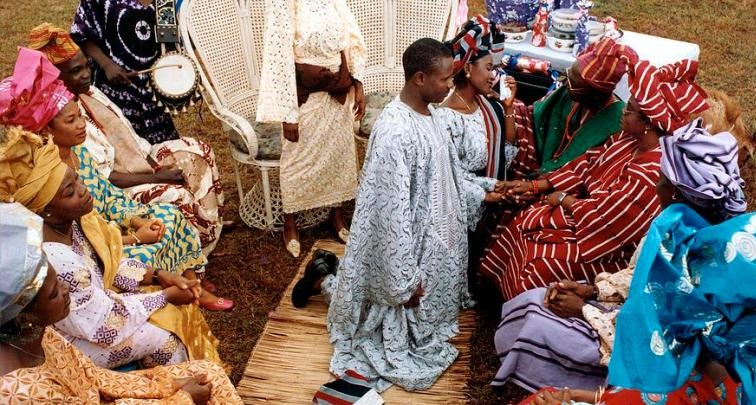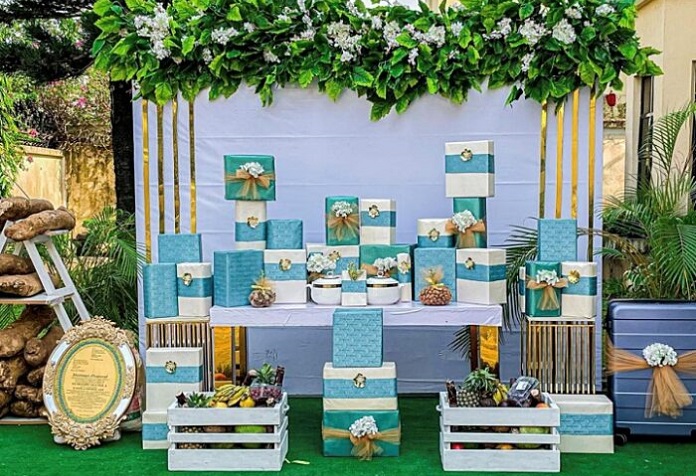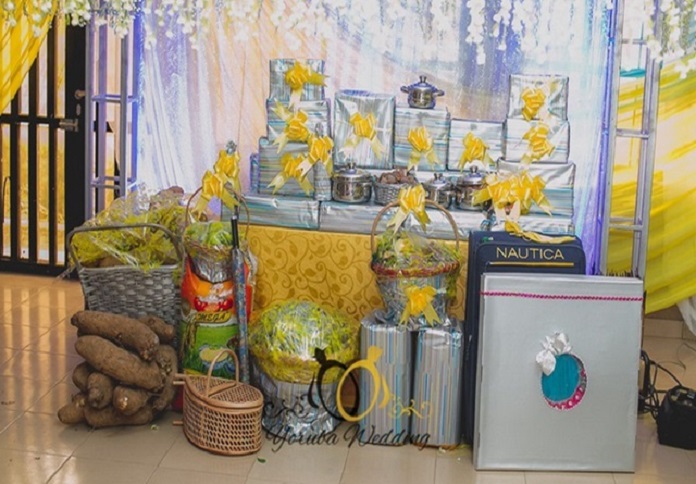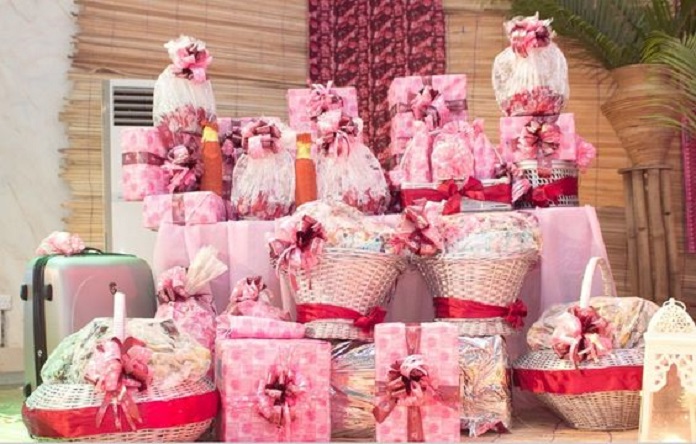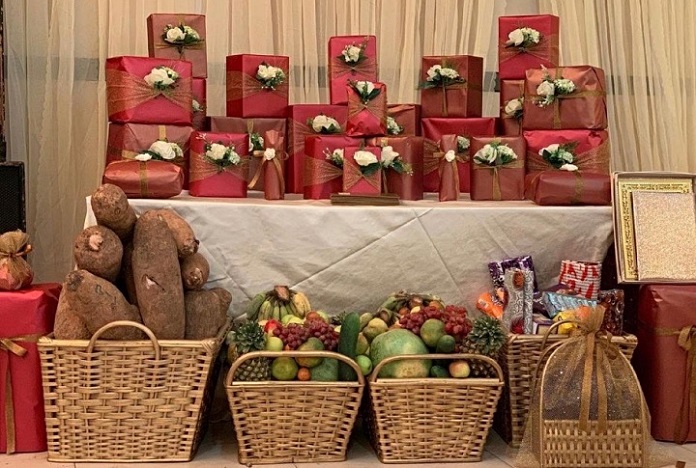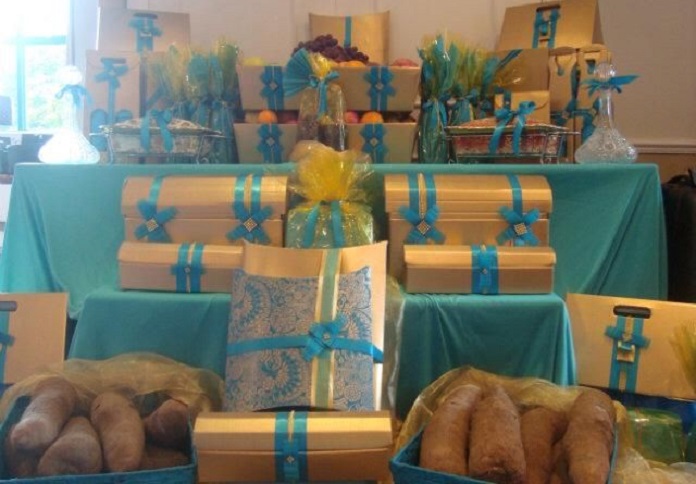Eru Iyawo is a Yoruba traditional wedding engagement requirement often presented by the groom’s family to the bride’s family. The list which often includes a bible or Quran, an engagement ring, and baskets of fruits, is packaged carefully by the groom’s family and presented to the bride’s family on the traditional wedding day as a show of appreciation for raising a daughter that is set to be married into the groom’s family.
The Eru Iyawo is an important marriage practice in Yoruba land where traditional marriage is symbolic and an integral part of the people’s culture. So, if you are about to get engaged to a Yoruba bride, here are important details about the Yoruba traditional engagement and marriage rites you should know beforehand.
Yoruba Bride Price List (Eru Iyawo List)
The gift items contained in the traditional Yoruba bride price list vary from one state or community to another. It is mostly determined by what part of Yorubaland the bride’s family comes from. However, some items like the Bible/Quran, and bitter kola, must be found in the list no matter what part of Yorubaland the bride comes from.
Unfortunately, the bride has no say as to what is requested by her family and the bride’s family can choose to request more or fewer items depending on their financial status. The following are the list of items contained in the Yoruba bride price list:
- Bible for Christians or Quran, praying mat, praying kettle, rosary, white hijab, veil, and tasbir for Muslims
- Engagement rings for bride and groom
- A proposal letter
- 1 Big suitcase containing clothes, shoes, and handbags including Aso-oke, lace and Ankara fabric
- 1 Wristwatch, earrings, bangles, and chains
- 1 Umbrella
- 1 Set of dishes
- 2 Cartons of malt
- 2 Cartons of soft drinks
- 2 Cartons of bottled water
- 2 Bottles of non-alcoholic wine
- 2 Cartons of fruit juice
- 1 Bag of rice
- 1 Pack of sugar
- 1 Bag of salt
- 2 Baskets of fruit
- 2 Decanters filled with honey
- 1 Keg of palm wine
- 1 Keg of groundnut oil
- 42 Bitter kolas (Orogbo)
- 42 Tubers of yam (Isu)
- 42 Kolanuts (Obi abata)
- 42 Chilli/Alligator peppers (Atare)
- 42 pieces of dried fish (Eja Osan)
- 1 Dish of peppered cornmeal (Aadun)
- Assorted biscuits and sweets
Cash Envelopes
- Owo Ori (The Bride Price) – Varies
- Owo Ijoko Agba (Money for the elders’ consent) – N5,000
- Owo Baba Gbo (Money for the bride’s father’s consent) – N5,000
- Owo Iya Gbo (Money for the bride’s mother’s consent) – N5,000
- Owo Ikanlekun (Door knocking fee) – N1,000
- Owo Isiju Iyawo (Fee for unveiling the bride) – N2,000
- Owo Aeroplane (Bride transportation fee) – N1,000
- Owo Iyawo Ile (Money for the Housewives) -N5,000
- Owo Omo Ile (Money for the Children of the household) – N5,000
- Owo Letter kika (Letter reading fee)- N2,000
- Owo Isigba (Engagement gifts unveiling fee) – N2,000
- Owo Alaga Ijoko (Master of Ceremonies fee) – N2,000
- owo telephone (Fee to call the bride out) – N500
The cash envelopes listed above are collected at different points during the engagement ceremony while the gift items are arranged at the wedding venue before the start of the wedding at the venue. In cases where the bride’s family is not financially buoyant enough to take fully prepare for the ceremony, they may seek their in-law to provide some specific items for the guests that will be present for the wedding ceremony.
During the wedding or engagement ceremony, the bride is sometimes asked to pick the most important item she would need in her home from the list of items presented by the groom’s family. It is also expected for the bride to pick the holy book as it is believed the strongest foundation on which a marriage is built.
Aside from the holy book, every item presented in the list is symbolic of certain marriage blessings. The alligator pepper, for example, represents the family’s prayer for the couple to have many children.
Furthermore, the owo ori or bride pride is often returned to the groom’s family after the wedding ceremony is over. This, according to general beliefs in Yorubaland, is to show that the bride is not sold out to the groom’s family and that no amount of money can equate to the money spent on her upbringing, education, and other things.
Is the Eru Iyawo List the Same as the Bride Price?
Bride price in Yoruba land is not the same as the Eru Iyawo but it is one of the items required of the groom and his family to provide while presenting the Eru Iyawo on the wedding day. The amount to be paid as bride pride (Owo Ori Iyawo) varies from one Yoruba community to another but it is often between N1000 to N5000. The money is neatly packaged in an envelope and sometimes placed in a well-decorated basket or box.
The Owo ori or bride price is not the only cash that is presented to the bride’s family. Also required from the groom’s family is some cash to help foot the wedding ceremony among other things.
Is Yoruba Bride Price List Negotiable?
Yes, the eru iyawo list is negotiable but this is purely between the bride and the groom’s family. While the bride and the groom are not permitted to interfere in the matters pertaining to the list, the two families can come together and deliberate on what the groom and his family bring on the wedding day.
It is a must for the groom’s family to buy, package, and present the Eru Iyawo items for the ceremony. However, in cases where the groom’s family is not able to provide everything on the Eru Iyawo list due to some circumstances, they are allowed to pay for the missing items in cash. The groom’s family is not allowed to pay for everything on the list in cash. Some items must be physically presented at the wedding ceremony.
How the Eru Iyawo List is Presented to the Groom’s Family
The Eru Iyawo list is often presented to the groom’s family during the day set for the introduction. Before that takes place, the groom-to-be is expected to first visit his bride-to-be’s family and seek their consent and blessing to propose to their daughter. If granted, he goes ahead to propose to his bride and if she accepts his marriage proposal, the two can then go ahead to announce their engagement to their respective families.
This is then followed by an introduction ceremony (known as “MOMI MO E’ in Yoruba) whereby all members of the couple’s family meet each other for the first time. The family introduction is often a small ceremony organized by the bride’s family to meet with their in-law. The ceremony which is held at the bride’s home involves not just the immediate members of both families but members of their extended families as well.
At the ceremony, the bride’s father who is the eldest member of her family will then present the Eru Iyawo list which is also known as the bridal or wedding list. The completion of the family introduction meeting jump-starts the wedding planning phase.
How is the Yoruba Bride Price List Packaged?
Packaging of the Eru Iyawo is a big deal in today’s Yoruba wedding ceremonies and as such, the presentation must be made in a colorful way. In the modern Yoruba wedding event, the gift items are carefully packaged and decorated to reflect the colors of the day. Check out some colorfully-packaged Eru Iyawo items below
- Yoruba bride price list items in White and Sea green package
- Eru Iyawo wrapped in All-Yellow and Silver Wrappings
- Eru Iyawo in a touch of pink wrap
- Eru Iyawo in Oxblood and Gold Wrap
- Eru Iyo packaged in Blue and gold wrap
